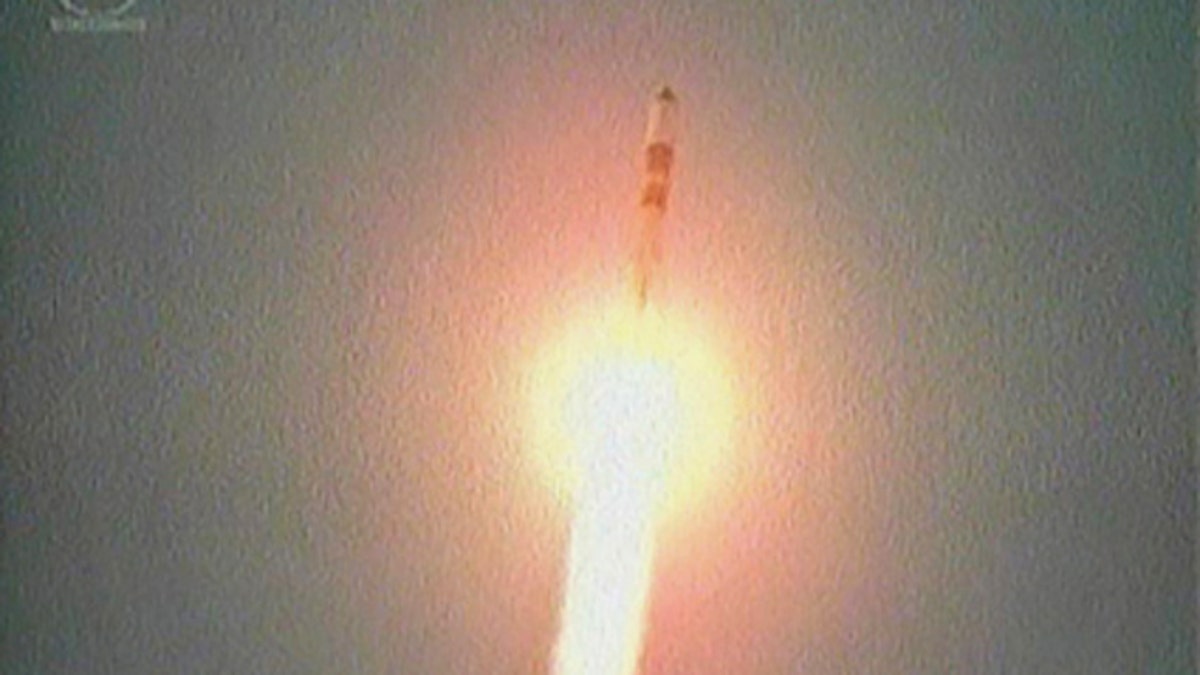
The unmanned Russian Progress 38 cargo ship launches from the Baikonur Cosmodrome in Kazakhstan on June 30, 2010 carrying 2.5 tons of supplies for the station's Expedition 24 crew. (Roscosmos/NASA TV)
An unmanned Russian cargo ship veered out of control near the International Space Station on Friday, sailing clear past the orbiting lab instead of docking on autopilot, as engineers on Earth struggle to determine what went wrong.
The robotic cargo ship Progress 38 was slated to dock at the space station at 12:58 p.m. EDT (1658 GMT) but lost its navigational lock on the orbiting lab about 28 minutes before the rendezvous.
"The Progress literally flew past the station, but at a safe distance from the outpost," NASA commentator Rob Navias said. "The station crew reported seeing the Progress drift beyond their view, as they worked to reestablish telemetry with the spacecraft."
The six people living aboard the space station -- three Americans and three Russians -- were never in any danger, NASA officials said.
The Progress 38 spacecraft flew by the space station at a distance of nearly 2 miles away, posing no threat of impact. But because of its orbit, there was no second chance to dock the spacecraft by remote control today.
"It's been officially decided that there will be no docking today," Russian flight controllers radioed the station crew.
Flight controllers at Russia's Mission Control team in Moscow are working to determine when a second attempt to dock the spacecraft may occur. Because of orbital mechanics, it may be possible to try another docking attempt in 48 hours, but that still remains to be determined, Navias said.
The aborted docking attempt is the second malfunction in a row for Russia's usually reliable Progress cargo ships.
On May 1, cosmonauts on the space station had to take remote control of the Progress 37 cargo ship when it experienced a space navigation system glitch during its own docking attempt.
Russia's robot space freighters
Russia's automated Progress cargo ships have a long track record of delivering supplies to the International Space Station. They rely on a radio beacon system called Kurs that is designed to allow the spacecraft to dock itself at the space station.
Cosmonauts on the space station can also take remote control of incoming Progress spacecraft using a console inside the station's Russian segment. Space station commander Alexander Skvortsov was getting that remote control console – called the Telerobotically Operated Rendezvous Unit (TORU) – ready when the Progress 38 vehicle veered off course.
"I don't think there was any impact to Progress," a Russian flight controller told Skvortsov in a discussion over whether the TORU system may have inadvertently sent a corrupt command to the cargo ship, aborting the rendezvous.
Navias said that once the Progress 38 spacecraft's navigation system went offline, the cargo ship automatically aborted its docking attempt as it is designed to.
Space station supplies
Known in Russia as Progress M-06M, the new Progress 38 spacecraft is packed with nearly 2.5 tons of fresh food, clothes, equipment and other supplies for the space station's six-person crew. It launched Wednesday from Baikonur Cosmodrome in Kazakhstan.
Packed aboard the spacecraft are 1,918 pounds of propellant for the station, 110 pounds of oxygen, 220 pounds of water and 2,667 pounds of dry cargo -- which includes spare parts, science equipment and other supplies.
Navias said those supplies are not critical for the space station's crew. Another Progress spacecraft is due to launch toward the space station in early September.
Russia's disposable Progress spacecraft are similar in appearance to the three-module Soyuz space taxis that ferry crews to and from the space station.
Both vehicles have a propulsion and orbital module, however Progress vehicles do not have a crew-carrying module like the Soyuz ships. Instead, Progress vehicles are equipped with a propellant module to store fuel for the space station's maneuvering thrusters.
Copyright © 2010 Space.com. All Rights Reserved. This material may not be published, broadcast, rewritten or redistributed.








































